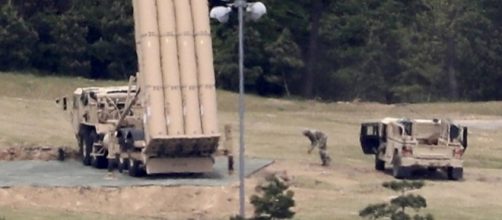The US operated Terminal High Altitude Defense system or THAAD, an early detection system for incoming missile attacks, can't warn Seoul immediately because of communication problems. This is reported by the Korean herald as it reveals lapses in the new anti-missile system currently installed in South Korea. This information is not included in the official reports released to the media over the real situation of the missile defense system, the Herald reported.
What are the problems faced by the THAAD system?
According to reports, the latest missile launch made by North Korea wasn't reported in real time to the South Korean military, which the new missile defense should provide.
The problem lies with the line of communication between US intelligence operating the THAAD and the South Korean military.
It is reported that the latest missile launch from the north was relayed to South Korea over a phone call and through word of mouth. The speed of information is not present at the moment as the communication system that will link US intelligence to South Korean intelligence is not yet operational.
How will the US military coordinate with South Korean over the new threat of functional North Korean missiles?
At the moment, the US and its counter part in South Korea are building a data-link system, which will share real-time information pertaining missile detection between the two countries.
However, the entire system is expected to be functional at the end of the year at most. Until then, information between the two countries will course through third party means and in worse cases, through local phone calls and runners.
The United States had completely delivered all of the key components of the THAAD system, including a sophisticated radar and interception missiles. However, even with everything installed, at the moment the THAAD system is still not able to fully defend South Korea and Japan from an all-out missile attack.
Amidst this problems, US forces in the Korean peninsula continues to cooperate with South Korea as it pressures Pyongyang. Japan, on the other hand, has started to be active militarily since the second world war.
Though the Japanese constitution doesn't yet fully allow the reconstruction of the Japanese military, Prime minster Shinzo Abe is spearheading a pro-militarization stance, which is making countries like China and Korea, a little bit weary.


